Supplemented foods: Share information about supplemented foods
On this page
- Sharing information about supplemented foods
- Awareness messages to share about supplemented foods
- Content for social media
- Articles to share
- Audio recording and script to share
- Video to share about supplemented foods
- Contact us
Sharing information about supplemented foods
We want to increase consumers’ awareness of supplemented foods and their labels to support their ability to:
- understand what supplemented foods are
- distinguish them from other foods and natural health products
- interpret the cautions appropriately
This will allow them to make informed food choices for themselves and their families.
While everyone will benefit from the messages, our focus is on those most at risk, as identified in the cautionary statements, including:
- those under the age of 14
- those sensitive to caffeine
- those who are pregnant and breastfeeding
- those who consume supplements and supplemented foods
Health professionals, industry and consumers can help raise awareness about supplemented foods and their labels. Please share this information with your networks and colleagues to increase the reach. We encourage you to follow Health Canada on Facebook, X (formerly Twitter), LinkedIn and Instagram to stay up to date.
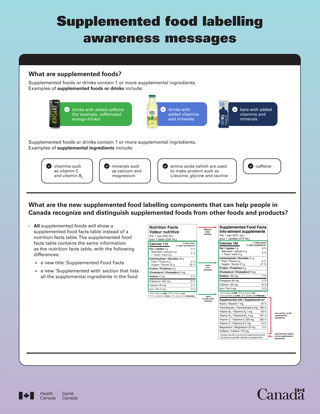
Download the alternative format
(PDF format, 313 KB, 2 pages)
Awareness messages to share about supplemented foods
Copy and paste these messages and share them with your networks.
Messages about supplemented foods
- Supplemented foods or drinks contain 1 or more supplemental ingredients. Examples of supplemented foods and drinks include:
- drinks with added caffeine (for example, caffeinated energy drinks)
- drinks with added vitamins and minerals
- bars with added vitamins and minerals
- Supplemented foods or drinks contain 1 or more supplemental ingredients. Examples of supplemental ingredients include:
- vitamins such as vitamin C and vitamin B6
- minerals such as calcium and magnesium
- amino acids (which are used to make protein) such as L-leucine, glycine and taurine
- caffeine
Messages about supplemented food labels that can help people in Canada recognize and distinguish supplemented foods from other foods and products
- All supplemented foods will show a supplemented food facts table instead of a nutrition facts table. The supplemented food facts table contains the same information as the nutrition facts table, with the following differences:
- a new title: Supplemented Food Facts
- a new ‘Supplemented with’ section that lists all the supplemental ingredients in the food
- Some supplemented foods contain supplemental ingredients that could pose a risk to health if:
- consumed in excess by the general population
- consumed by people who are:
- under the age of 14
- pregnant or breastfeeding
- sensitive to caffeine
- Some supplemented foods will carry a caution identifier on the front of the label. That means there’s a caution box somewhere else on the label. When you see this identifier, find the caution box to help decide if the food is right for you.
- Some supplemented foods must carry a caution box on the back or the side of the package because of the type or amount of supplemental ingredient in that food. Look for the word ‘caution’ and read the box to help decide if the food is right for you.
- The caution box could tell you who the food is not recommended for. Find out if it applies to you.
- The caution box could tell you to limit how much you eat or drink of the supplemented food so that you don’t have too much of any of the supplemental ingredient(s) in the food.
- The caution box could tell you not to eat or drink the supplemented food with other products so that you don't have too much of the same supplemental ingredients.
Message about the supplemented foods regulations that protect the health and safety of the people in Canada
- Health Canada published regulations for supplemented foods in July 2022. Health Canada now requires manufacturers to show specific labels on supplemented foods to help you make informed health decisions. You may have already seen these new labels. As of January 1st, 2026, all supplemented foods must have them.
Content for social media
You can share these posts through your social media channels.
For the general public
| Image | Text to share | Image title |
|---|---|---|
  
|
#SupplementedFoods are foods or drinks with one or more supplemental ingredients added to them, such as vitamins, minerals, amino acids, and caffeine. Examples include caffeinated energy drinks and bars with added vitamins. Canada.ca/SupplementedFoods |
New labelling for supplemented foods! |
 |
Did you know that a new caution identifier will appear on some foods or drinks you may have already been consuming? Learn if these #SupplementedFoods are right for you. Canada.ca/SupplementedFoods #ReadTheLabel |
Learn more about the new caution identifier on some supplemented foods |
 |
Supplemented foods, like caffeinated energy drinks or bars with added vitamins and minerals, are foods or drinks with one or more supplemental ingredients. You will start seeing a new supplemented food facts table on their labels that includes a 'Supplemented with' section listing all the supplemental ingredients. Learn more about supplemented foods and their new labels. Canada.ca/SupplementedFoods |
Learn more about the new supplemented food facts table |
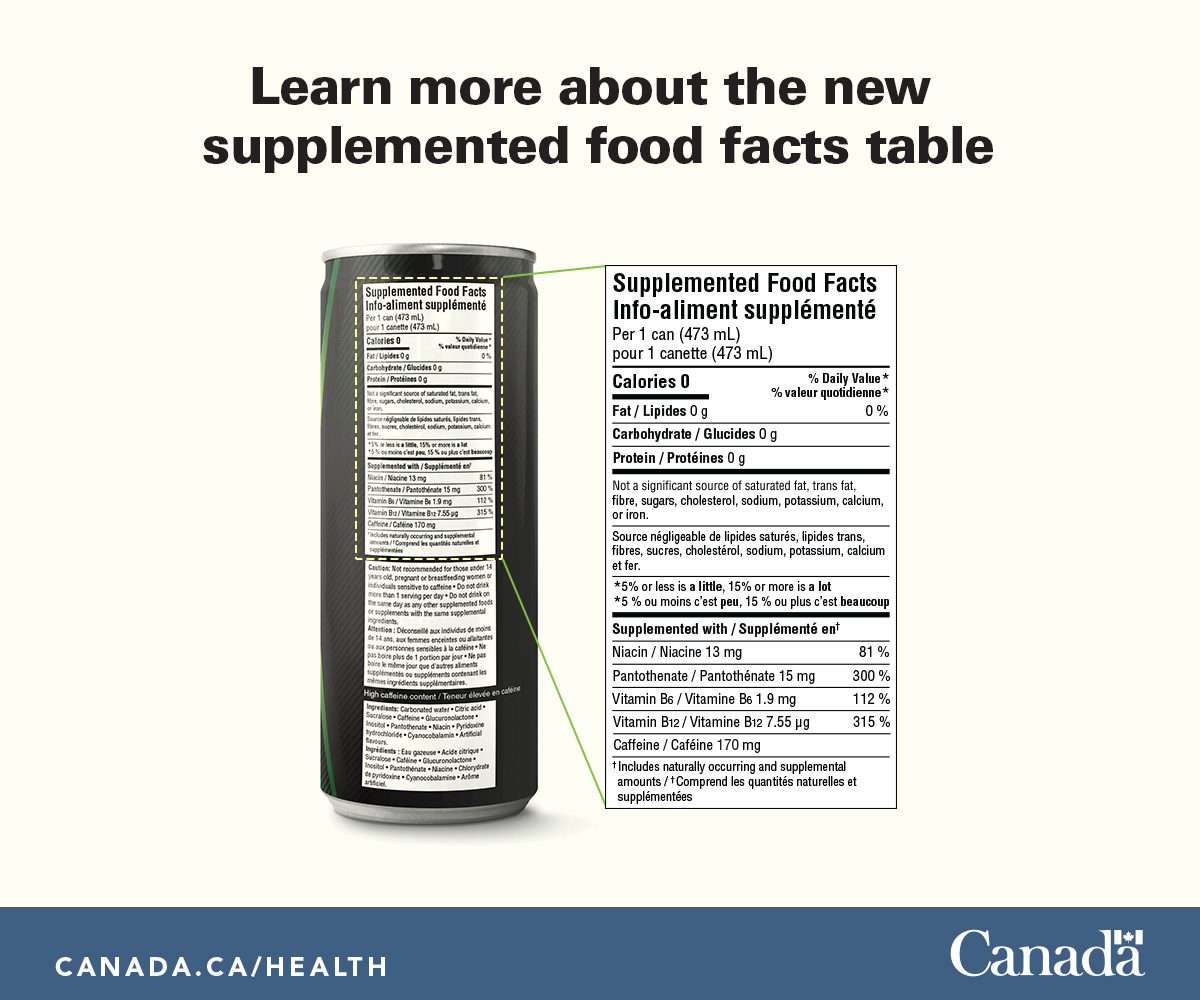 |
Supplemented foods are foods or drinks with one or more supplemental ingredients. Examples include caffeinated energy drinks and bars with added vitamins. You will start seeing a new supplemented food facts table instead of a nutrition facts table on these foods. Learn more about these new labels. Canada.ca/SupplementedFoods |
Learn more about the new supplemented food facts table |
For parents of those under the age of 14
| Image | Text to share | Image title |
|---|---|---|
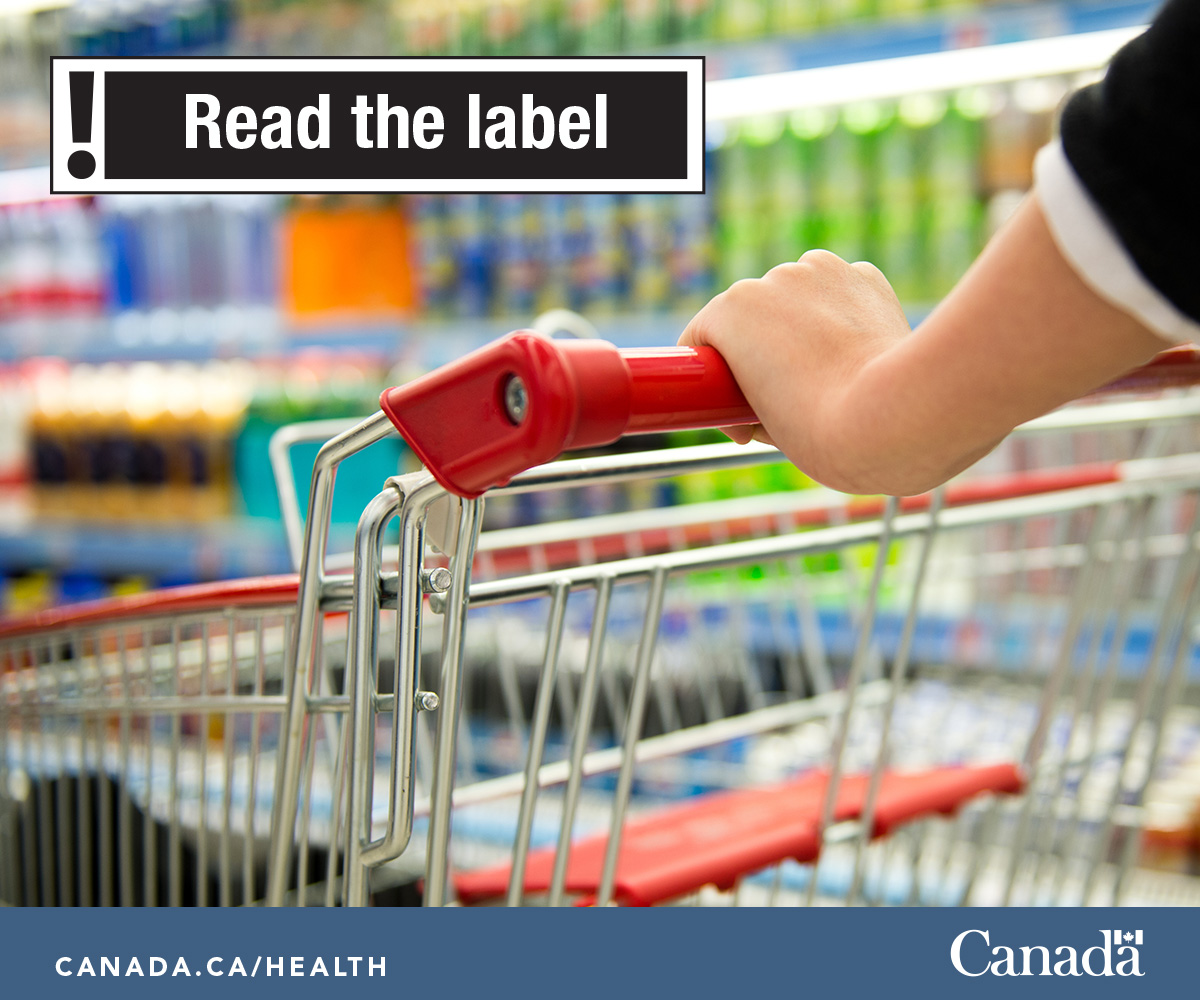 |
Some #SupplementedFoods, such as caffeinated energy drinks, are not recommended for those under the age of 14 because of the type or amount of supplemental ingredients. Make sure to #ReadTheLabel to make an informed choice. Canada.ca/SupplementedFoods |
Read the label |
Some supplemented foods, such as caffeinated energy drinks, are not recommended for those under the age of 14. Learn more about supplemented food labels to make informed food choices for your family. Canada.ca/SupplementedFoods |
||
 |
A new caution identifier is starting to appear on some #SupplementedFoods. Read the label to see if some cautions (such as "not recommended for those under 14 years old") apply to your child. Canada.ca/SupplementedFoods #NutritionLabelling |
Learn more about the new caution identifier on some supplemented foods |
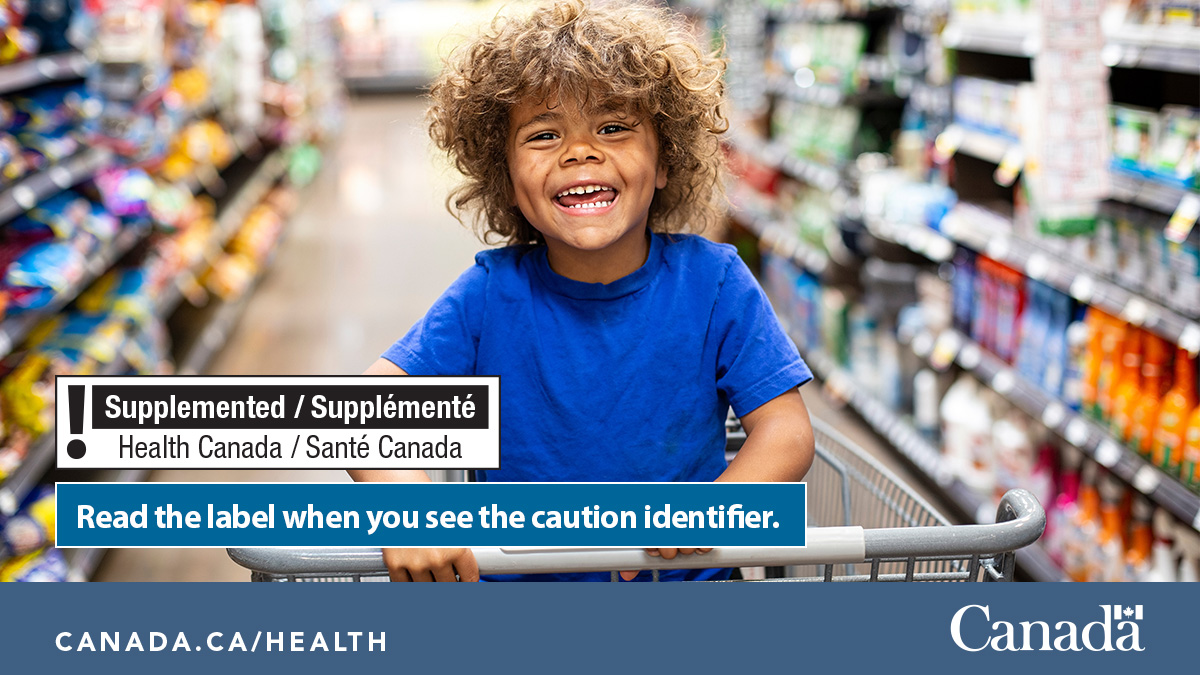 |
The new supplemented food caution identifier alerts consumers to review cautions on the back or side of a supplemented food or beverage. Make sure to read the label when shopping for your family. Canada.ca/SupplementedFoods #SupplementedFoods |
Read the label when you see the caution identifier |
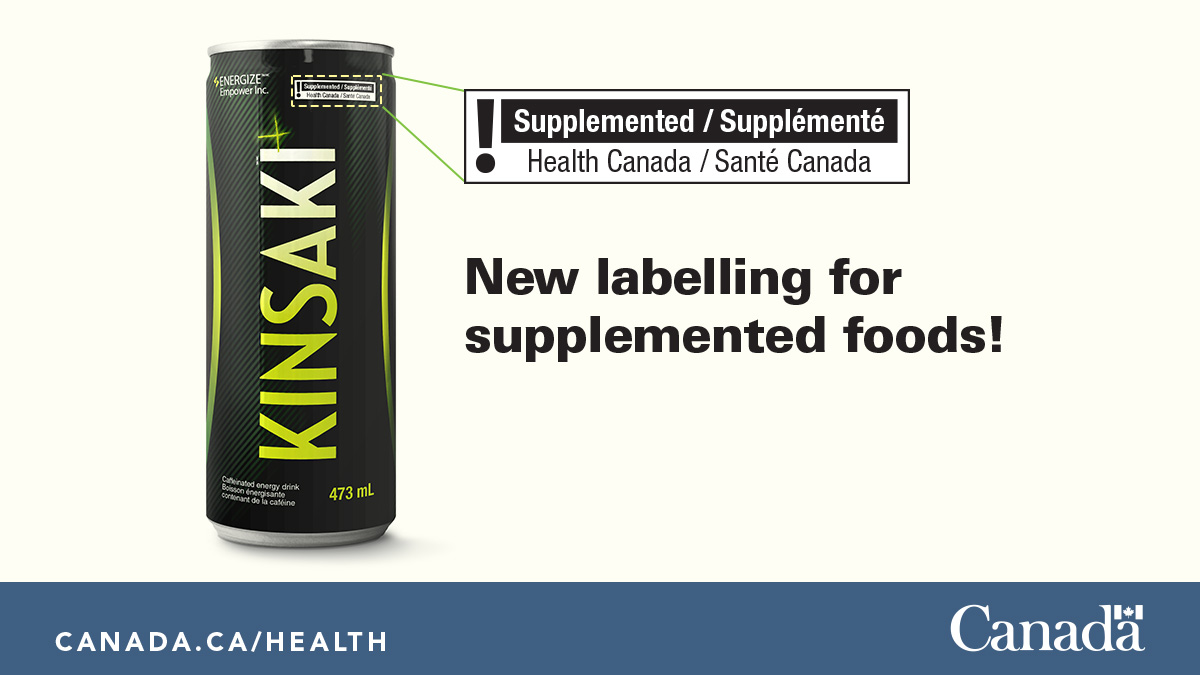 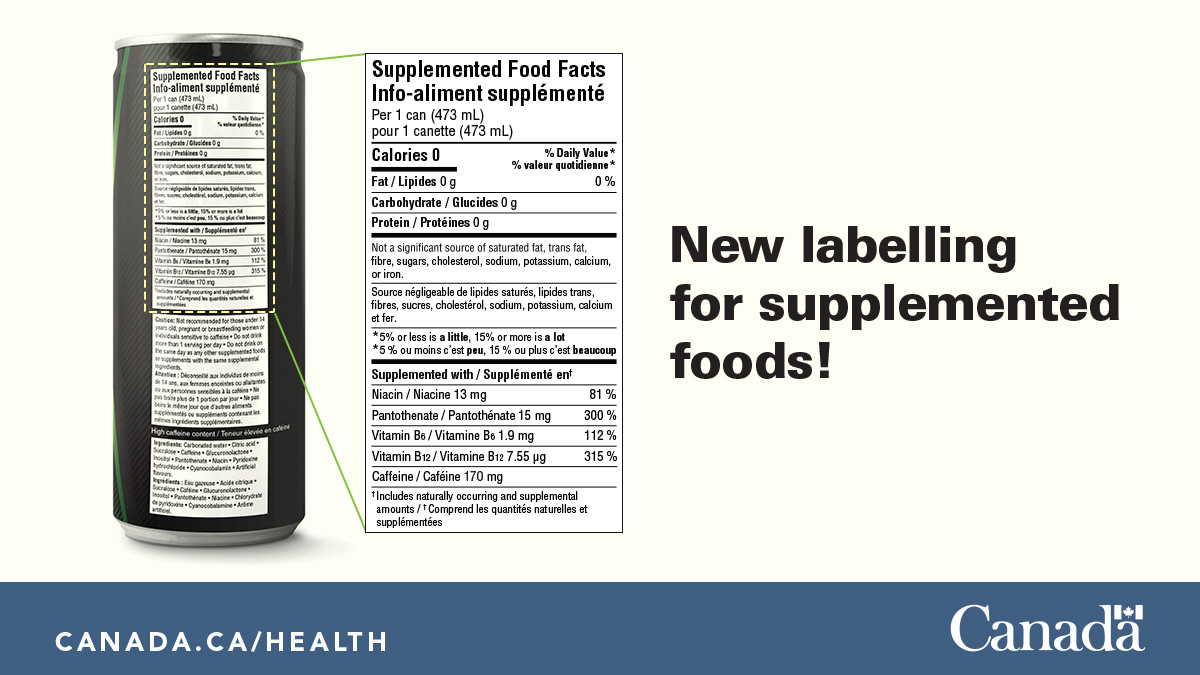 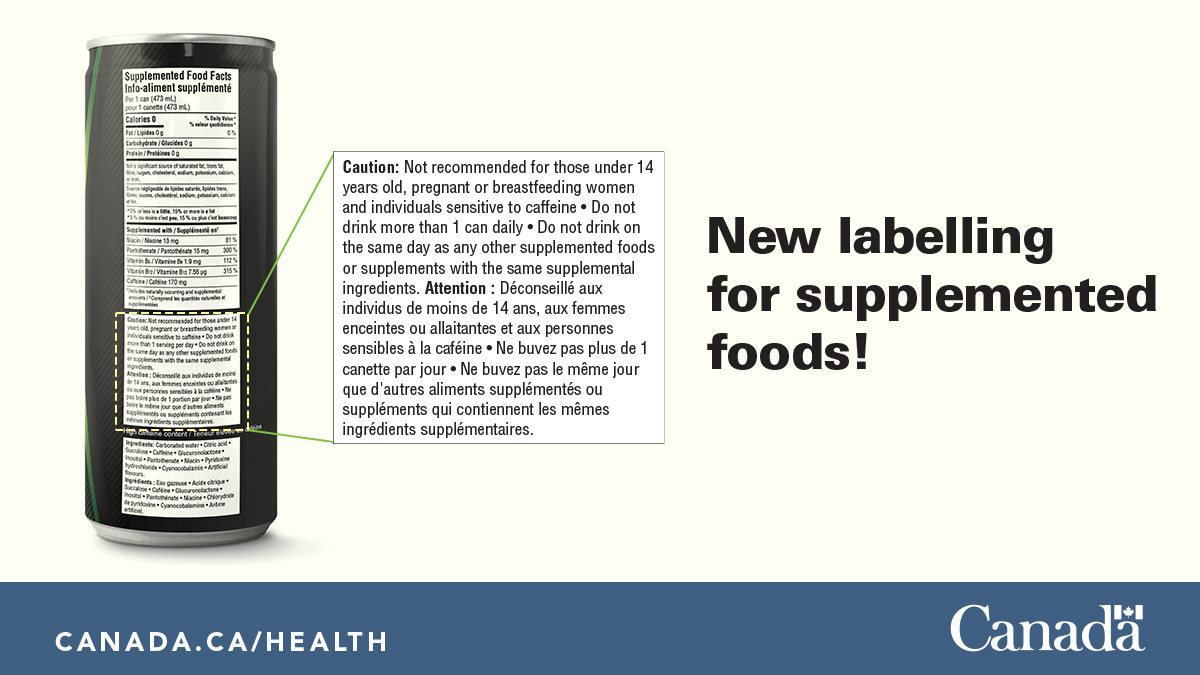 |
#SupplementedFoods, such as caffeinated energy drinks, have specific labelling requirements. Make sure to read the label when shopping for foods to make informed choices for you and your family. Canada.ca/SupplementedFoods |
New labelling for supplemented foods! |
Attention parents and caregivers! Are your kids consuming supplemented foods, such as caffeinated energy drinks? These drinks are not recommended for those under the age of 14 because of the type or amount of supplemental ingredients in them. Learn more about supplemented food labels to make informed food choices for your family. Canada.ca/SupplementedFoods |
New labelling for supplemented foods! |
|
 |
A new caution identifier is starting to appear on some supplemented foods. It alerts you to read the cautions like "not recommended for those under 14 years old." This is because some of these foods contain supplemental ingredients, such as caffeine, vitamins or minerals, that are not suitable for that age group. Make sure to read the label to make informed food choices for your family. Canada.ca/SupplementedFoods |
Look for new labelling on supplemented foods |
For pregnant and/or breastfeeding people
| Image | Text to share | Image title |
|---|---|---|
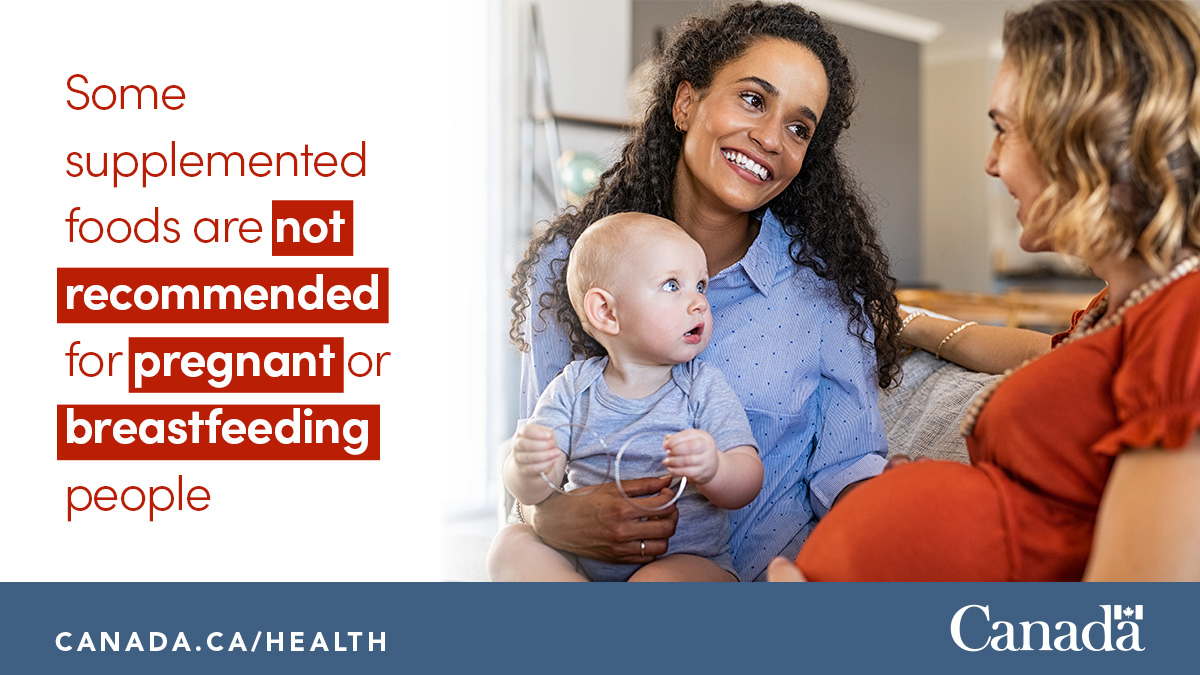 |
Some #SupplementedFoods are not recommended for people who are pregnant or breastfeeding because of the type or amount of supplemental ingredients in them. #ReadTheLabel and look for the new caution identifier when shopping. canada.ca/SupplementedFoods |
Some supplemented foods are not recommended for pregnant or breastfeeding people |
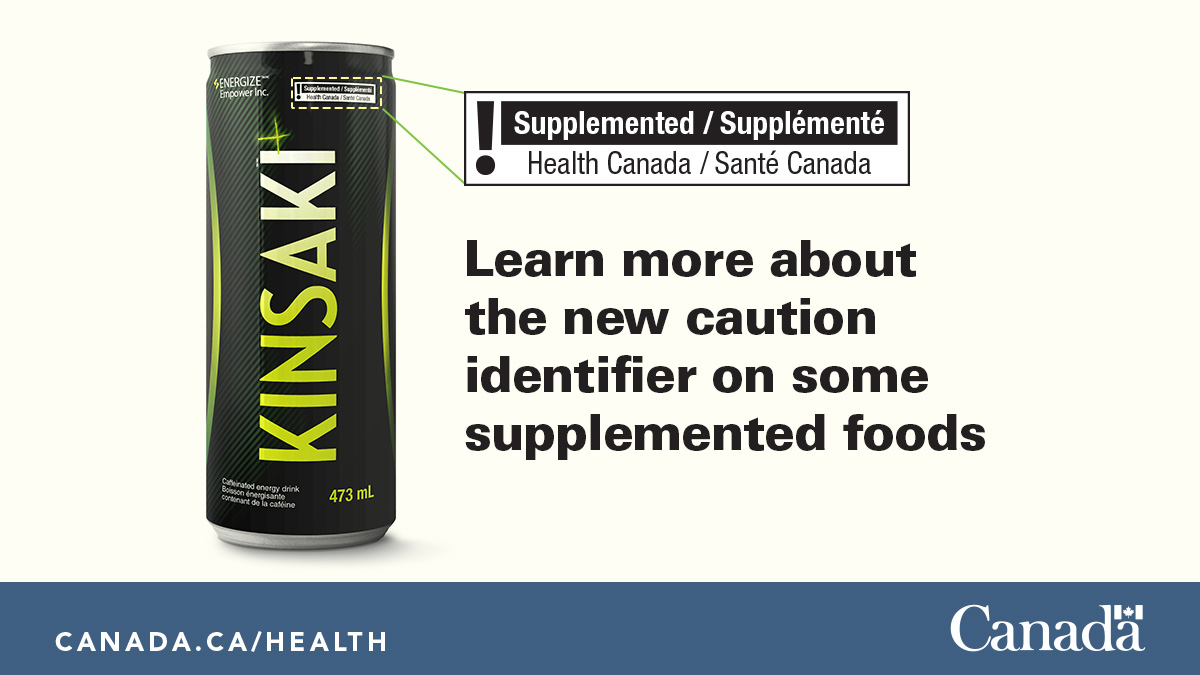 |
The caution identifier on #SupplementedFoods alerts you to look for a caution box on the label. If you are pregnant or breastfeeding, make sure to read the label because there may be a caution that applies to you. canada.ca/SupplementedFoods |
Learn more about the new caution identifier on some supplemented foods |
Have you noticed a new supplemented food caution identifier on some foods? This identifier alerts you to look for cautionary statements on the back or side of a product. Because of the type or amount of supplemental ingredients, many supplemented foods are not recommended if you are pregnant or breastfeeding. Make sure to read the label when shopping for foods. canada.ca/SupplementedFoods |
Learn more about the new caution identifier on some supplemented foods |
|
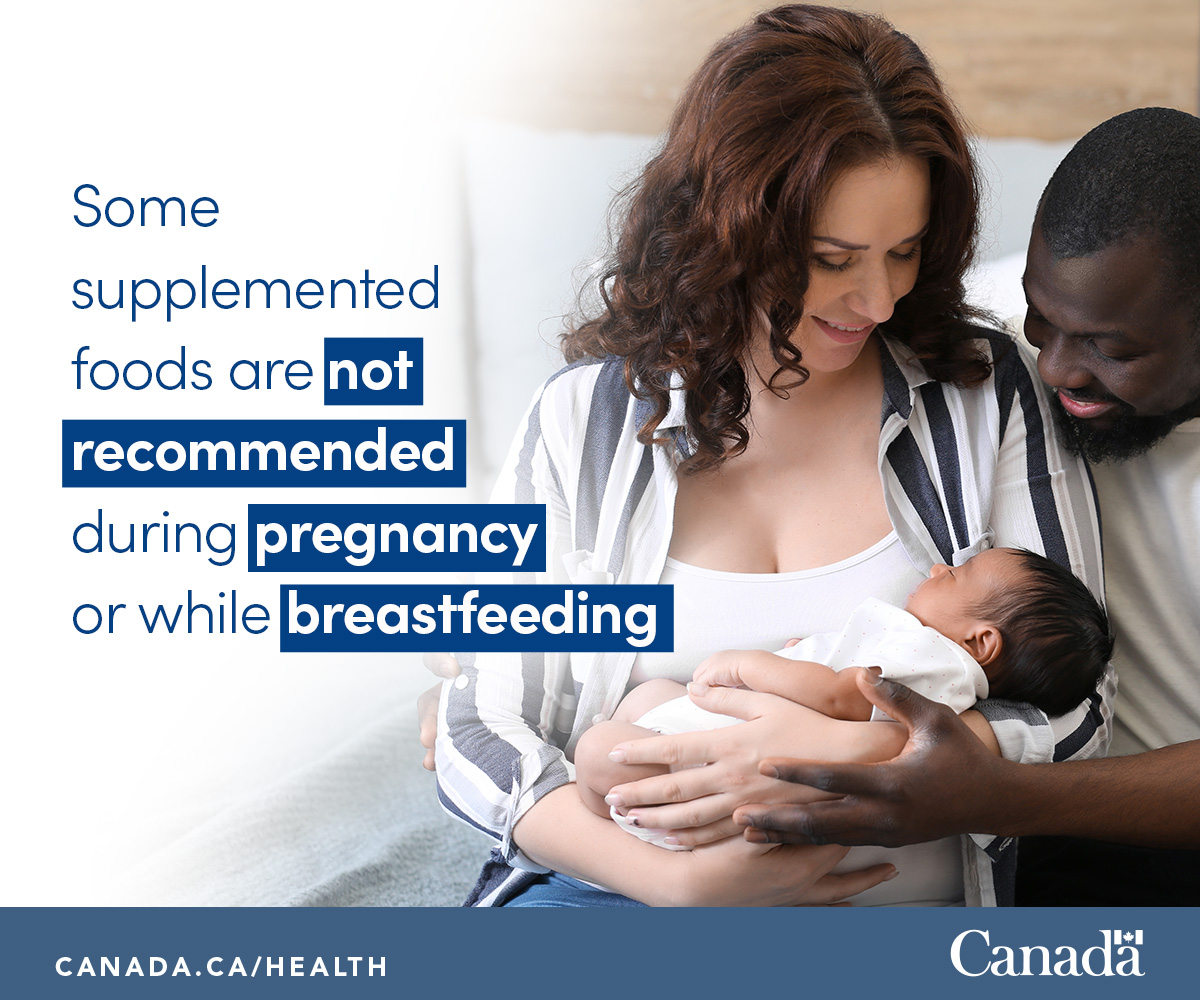 |
Some supplemented foods, such as caffeinated energy drinks, are not recommended for people who are pregnant or breastfeeding because of the type or amount of supplemental ingredients in them. If you're pregnant or breastfeeding, make sure to read the label when shopping for foods. canada.ca/SupplementedFoods |
Some supplemented foods are not recommended during pregnancy or while breastfeeding |
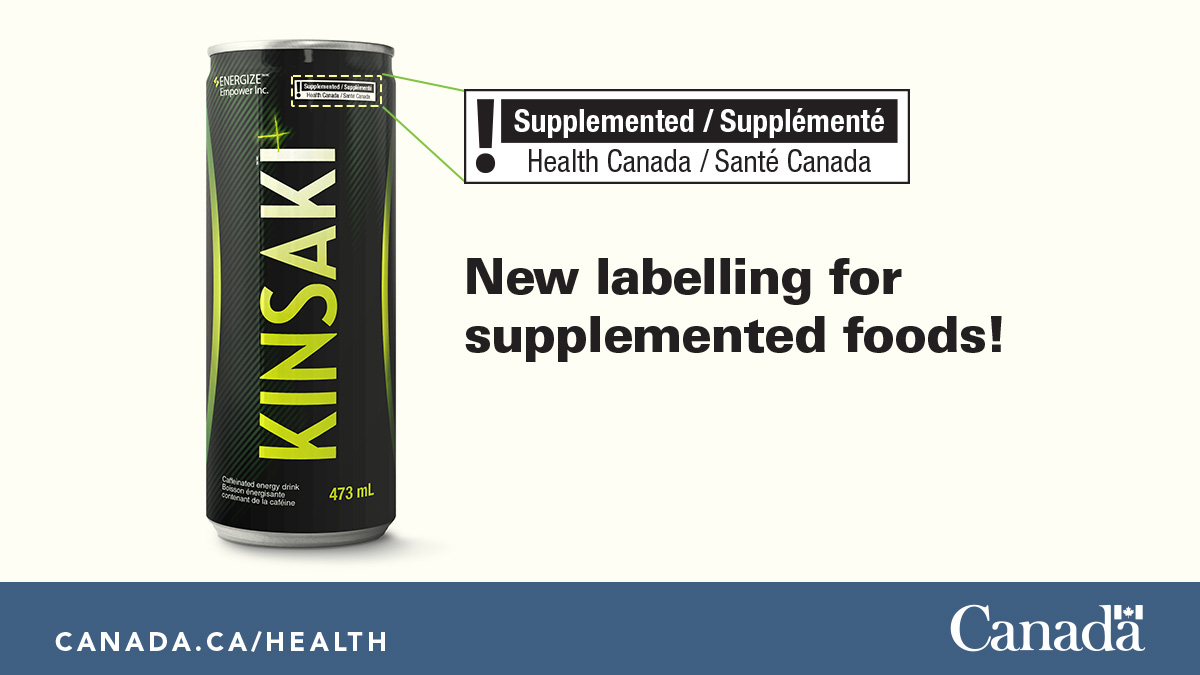  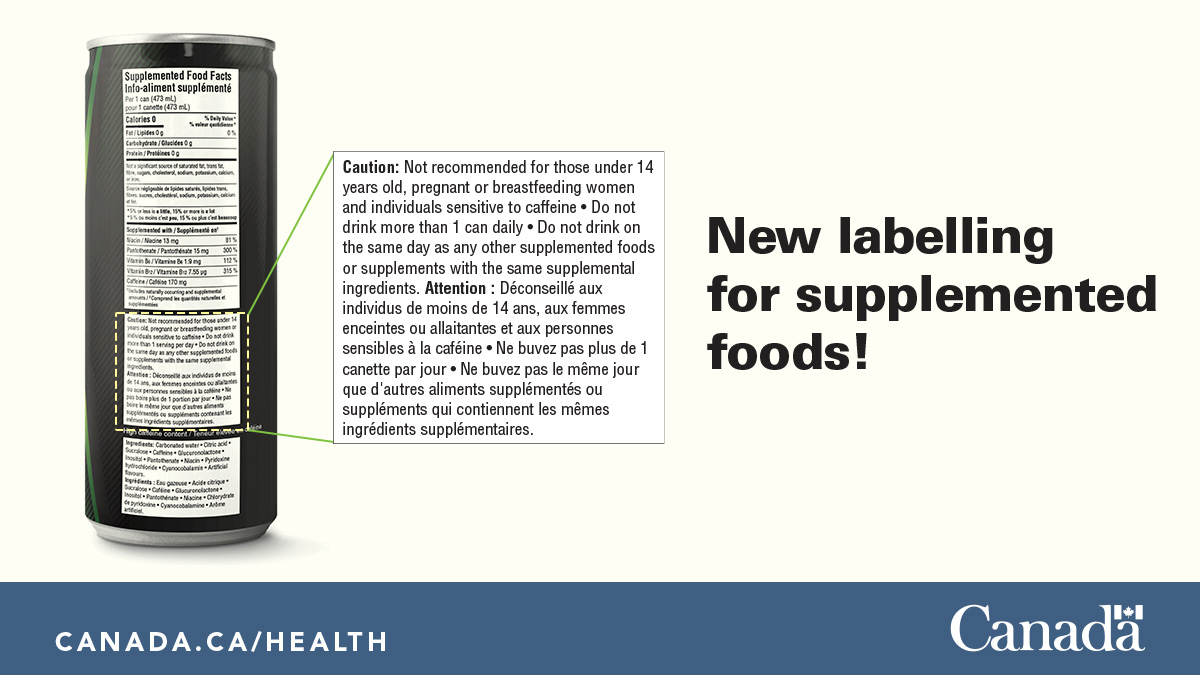
|
People who are pregnant or breastfeeding want what's best for their baby. And a big part of that begins by making informed food choices. Because of the type or amount of supplemental ingredients, many supplemented foods are not recommended for at-risk populations, such as people who are pregnant or breastfeeding. Make sure to read the label when shopping for foods. Canada.ca/SupplementedFoods |
New labelling for supplemented foods! |
For people who consume supplements and/or supplemented foods
| Image | Text to share | Image title |
|---|---|---|
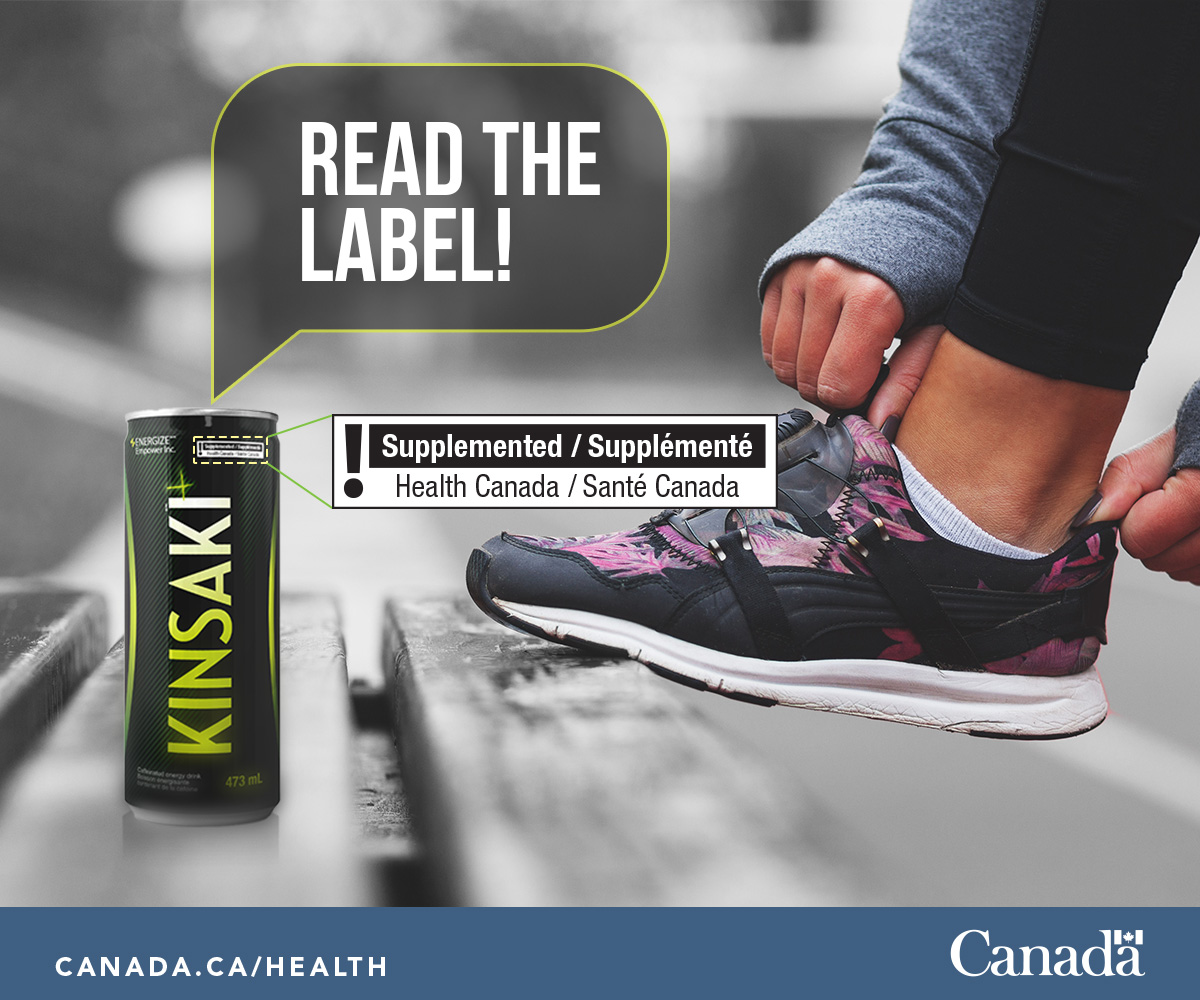 |
Are you using supplemented foods, like caffeinated energy drinks, or supplements before or after your workouts? Make sure to read the new labels on supplemented foods. Check the caution box to avoid doubling up on some ingredients, like caffeine. canada.ca/SupplementedFoods |
Read the label! |
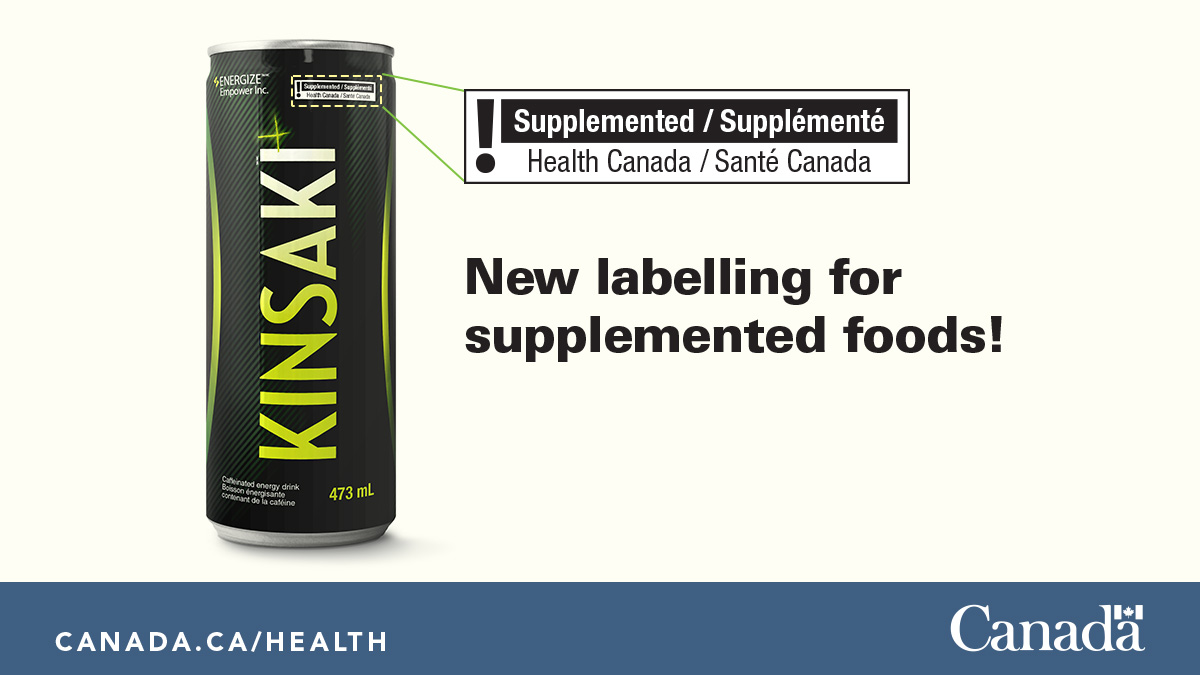   |
Do you take multivitamin or mineral supplements? Many supplemented foods also have added vitamins and minerals. Check out the new caution box on some of these foods to know whether you should avoid supplemented foods and supplements with the same ingredients, like vitamin A or magnesium. Canada.ca/SupplementedFoods |
New labelling for supplemented foods! |
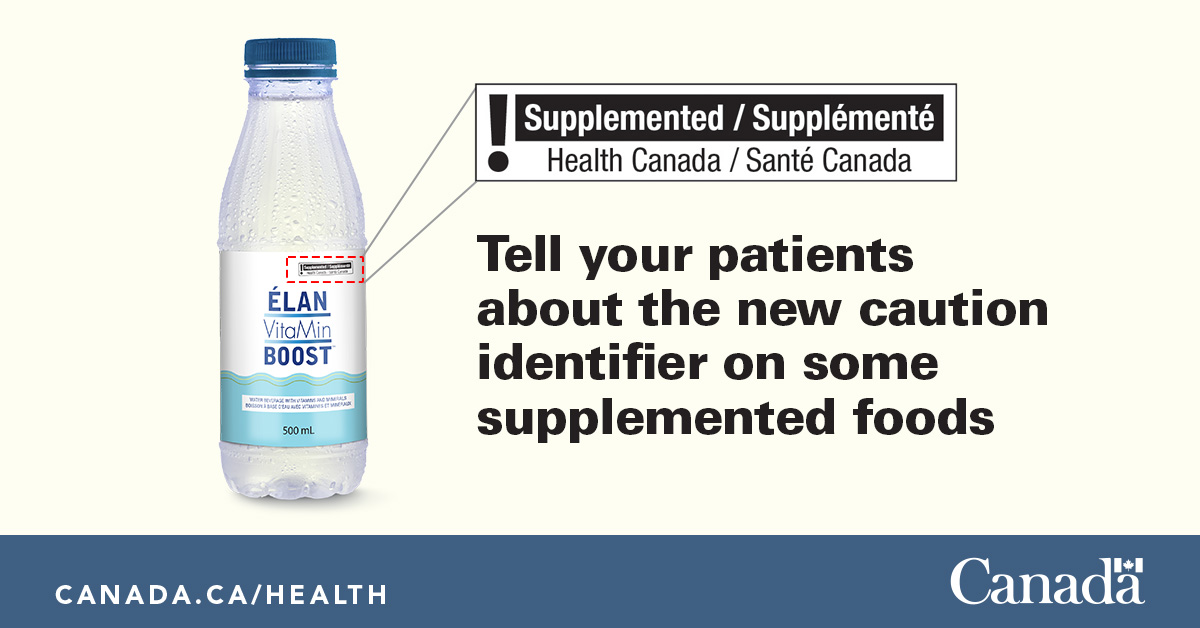 |
Heads up, health professionals! The new caution labels on some supplemented foods may affect some of your patients and clients taking multivitamin or mineral supplements. The label might tell them not to consume the supplemented food if they are taking supplements and/or other supplemented foods so that they don't have too much of the same ingredients. Encourage them to read the caution box to make an informed choice. #SupplementedFoods Canada.ca/SupplementedFoods |
Tell your patients about the new caution identifier on some supplemented foods |
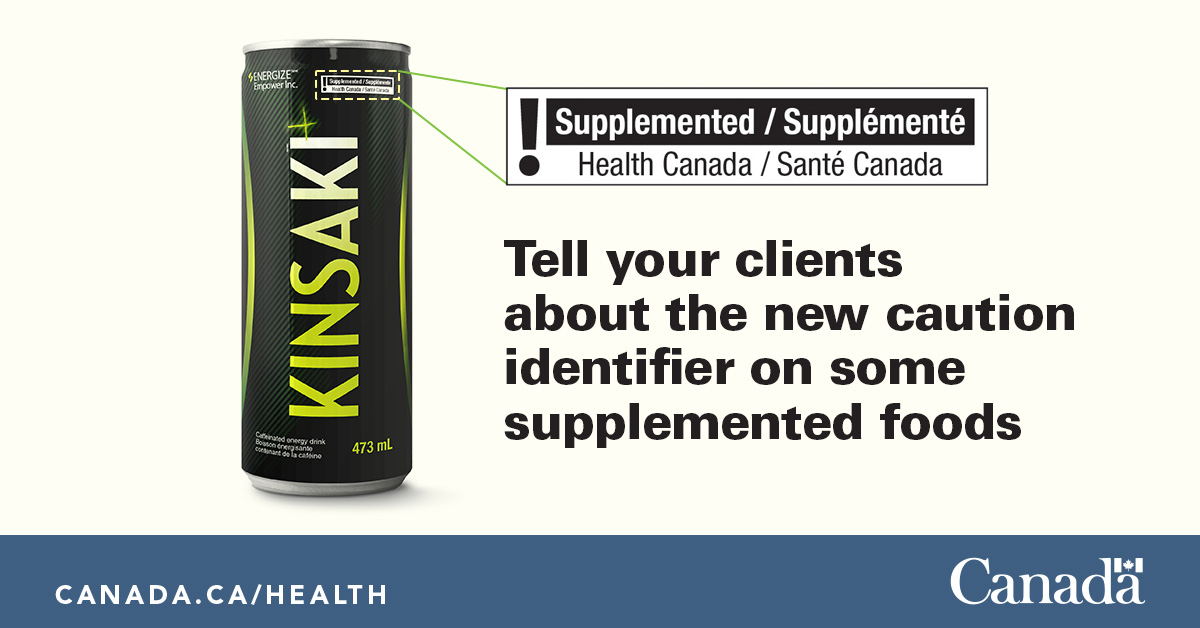 |
Do you work with recreational athletes? The new labels on supplemented foods may caution against combining them with other products with the same ingredients. Advise athletes to check the caution box for peace of mind when training. #SupplementedFoods Canada.ca/SupplementedFoods |
Tell your clients about the new caution identifier on some supplemented foods |
Articles to share
You can share these articles with your clients, patients, and networks, and/or use this content on your website, in your newsletters, or anywhere else you see fit.
- For the general population:
- For parents and caregivers: What parents and caregivers need to know about supplemented foods
- For people who are pregnant and/or breastfeeding: Decoding new caution labels on foods when you're pregnant or breastfeeding
- For students and recreational athletes: New cautionary labels on caffeinated energy drinks
- For people who consume supplements and/or supplemented foods: Discover if supplements and supplemented foods are one and the same
Audio recording and script to share
You can share this audio recording with your networks and through your social media channels, use it on your website, or anywhere else you see fit.
Learn about Canada's new supplemented foods labelling
Transcript: Learn about Canada's new supplemented foods labelling
Most of us are familiar with vitamin and mineral supplements. But did you know that there are foods and drinks on the market called "supplemented foods"?
These products have added ingredients, like vitamins, minerals and caffeine. Some can pose a risk to your health if you eat or drink too much of them or if they're consumed by someone who's pregnant or part of another vulnerable group.
Beginning January 2026, all supplemented foods in Canada will be required to have a table listing the type and amount of any supplemental ingredient added to them, so that consumers can make informed choices.
Some labels will also show a warning symbol that includes an exclamation mark on the front, as a cue to look for cautions elsewhere on the label. That may tell you to limit how much of it you consume, or if it's not recommended for people under 14 years old.
These new labels are already on some foods. Learn more at canada.ca/supplementedfoods.
Video to share about supplemented foods
You can share the video about supplemented foods with your networks and through your social media channels, use it on your website, or anywhere else you see fit.
Contact us
If you have any questions or comments, please send an e-mail to supplementedfoods-alimentssupplementes@hc-sc.gc.ca with the subject line SF Awareness.